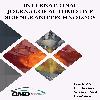Environmental Pollution Cost Analyses of a Compression Ignition Diesel Engine Fuelled With Tire Pyrolytic Oil-Diesel Blends
This paper represents the environmental pollution cost analysis of a single-cylinder, four-stroke, naturally aspirated, compression ignition diesel engine fuelled with tire pyrolytic oil (TPO)-diesel blends. TPO-diesel blends were prepared as 10 vol.% TPO + 90 vol.% diesel (TPO10D90), 30 vol.% TPO + 70 vol.% diesel (TPO30D70) and 50 vol.% TPO + 50 vol.% diesel (TPO50D50) blends. The experiments were con-ducted on test engine loads of 3 Nm, 6 Nm, 9 Nm and 12 m and on con-stant crankshaft speed of 2000 rpm. It was found that TPO10D90 had bet-ter performance compared to neat diesel and other blends considered in this study in terms of environmental pollution cost analysis. As a result, at engine load of 3 Nm, the specific environmental pollution costs of neat diesel and TPO10D90 were obtained to be 0.05361 $/kWh and 0.04724 $/kWh, respectively. It can be concluded that TPO-diesel blends having low TPO content can be used as alternative fuel for neat diesel in diesel engines in terms of environmental pollution cost analysis.
___
- [1] IOMVM, International Organization of Motor Vehicle Manufacturers, www.oica.net, 16 January 2020.
- [2] Czajczynska D, Krzyzynska R, Jouhara H, Spencer N. Use of pyrolytic gas from waste tire as a fuel: A review. Energy 2017; 134: 1121-1131.
- [3] Jantaraksa N, Prasassarakich P, Reubroycharoen P, Hinchiranan N. Cleaner alternative liquid fuels derived from the hydrodesulfurization of waste tire pyrolysis oil. Energy Conversion and Management 2015; 95: 424–434.
- [4] Idris R, Chong CT, Farid NA. Microwave-induced pyrolysis of waste truck tyres with carbonaceous susceptor for the production of diesel-like fuel. Journal of the Energy Institute 2019; 92: 1831-1841.
- [5] Luo S, Feng Y. The production of fuel oil and combustible gas by catalytic pyrolysis of waste tire using waste heat of blast-furnace slag. Energy Conversion and Management 2017; 136: 27–35.
- [6] İlkilic C, Aydin H. Fuel production from waste vehicle tires by catalytic pyrolysis and its application in a diesel engine. Fuel Processing Technology 2011; 92: 1129–1135.
- [7] Bodisco TA, Rahman SMA, Hossain FM, Brown RJ. On-road NOx emissions of a modern commercial light-duty diesel vehicle using a blend of tyre oil and diesel. Energy Reports 2019; 5: 349–356.
- [8] Frigo S, Seggiani M, Puccini M, Vitolo S. Liquid fuel production from waste tyre pyrolysis and its utilisation in a Diesel engine. Fuel 2014; 116: 399–408.
- [9] Koc AB, Abdullah M. Performance of a 4-cylinder diesel engine running on tire oil–biodiesel–diesel blend. Fuel Processing Technology 2014; 118: 264–269.
- [10] Murugan S, Ramaswamy MC, Nagarajan G. Performance, emission and combustion studies of a DI diesel engine using Distilled Tyre pyrolysis oil-diesel blends. Fuel Processing Technology 2008; 89: 152–159.
- [11] Yildiz I, Acikkalp E, Caliskan H, Mori K. Environmental pollution cost analyses of biodiesel and diesel fuels for a diesel engine. Journal of Environmental Management 2019; 243: 218-226.
- [12] Kanbur BB, Xiang L, Dubey S, Choo FH, Duan F. Life cycle-based enviroeconomic and thermal analyses of the inlet air-cooled microturbine systems with liquefied natural gas cold energy. Journal of Cleaner Production 2018; 174: 1338-1350.
- [13] Bejan A, Tsatsaronis G, Moran M. Thermal Design and Optimization. John Wiley and Sons., 1995.
- [14] EPDK, Republic of Turkey Energy Market Regulatory Authority, www.epdk.org.tr, 25 September 2019.
- [15] Tsatsaronis G, Pisa J. Exergoeconomic evaluation and optimization of energy systems-application to the CGAM problem. Energy 1994; 19: 287-321.
- [16] Hurdogan E, Ozalp C, Kara O, Ozcanli M. Experimental investigation on performance and emission characteristics of waste tire pyrolysis oil-diesel blends in a diesel engine. International Journal of Hydrogen Energy 2017; 42: 23373-23378.
- Yayın Aralığı: Yılda 4 Sayı
- Başlangıç: 2016
- Yayıncı: Otomotiv Mühendisleri Derneği
Sayıdaki Diğer Makaleler
Esra DOKUMACI, Kazım ÖNEL, Uğur AYBARÇ
